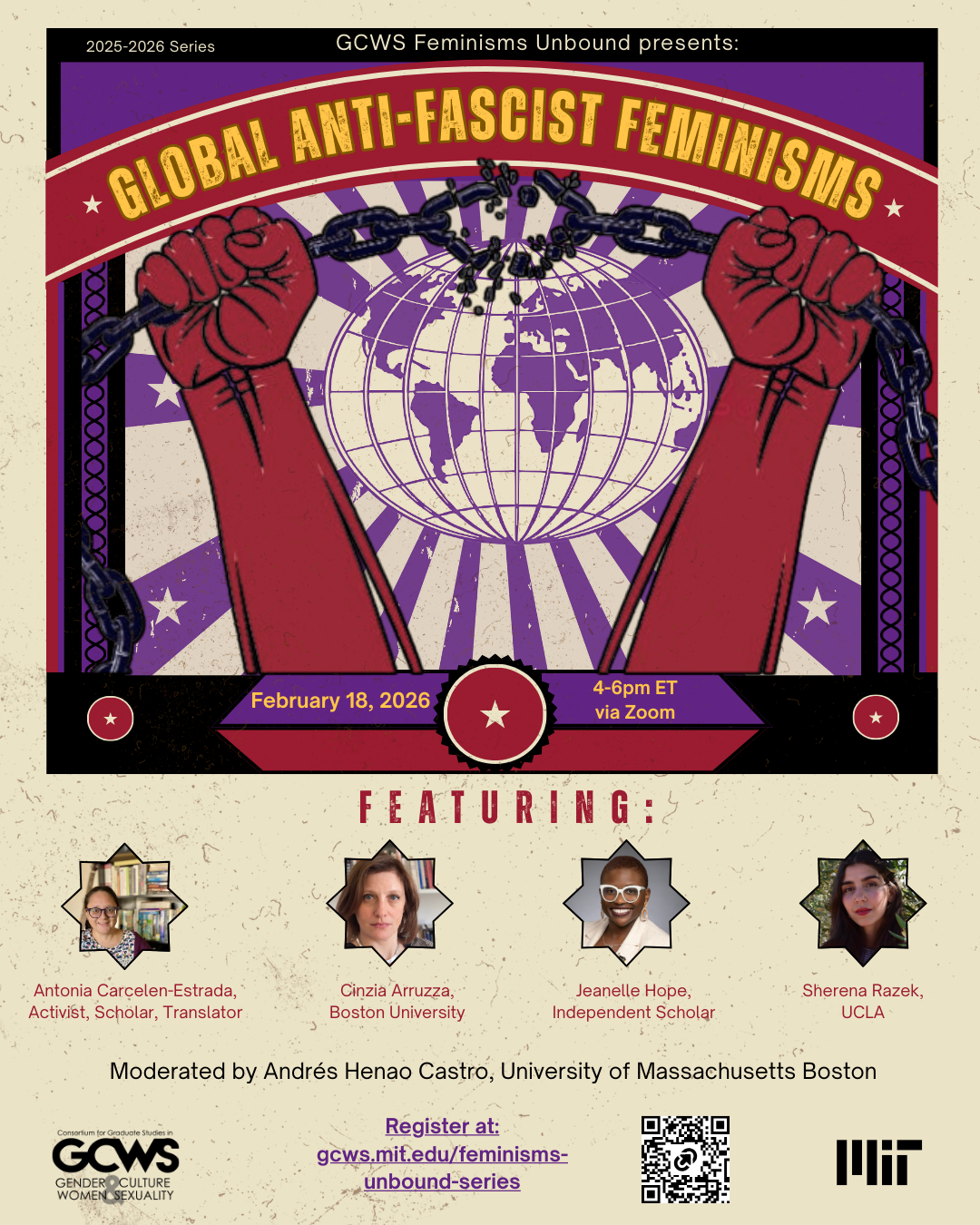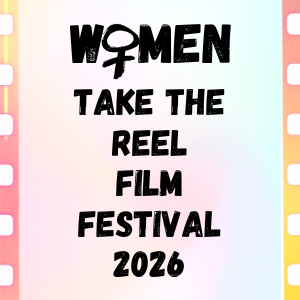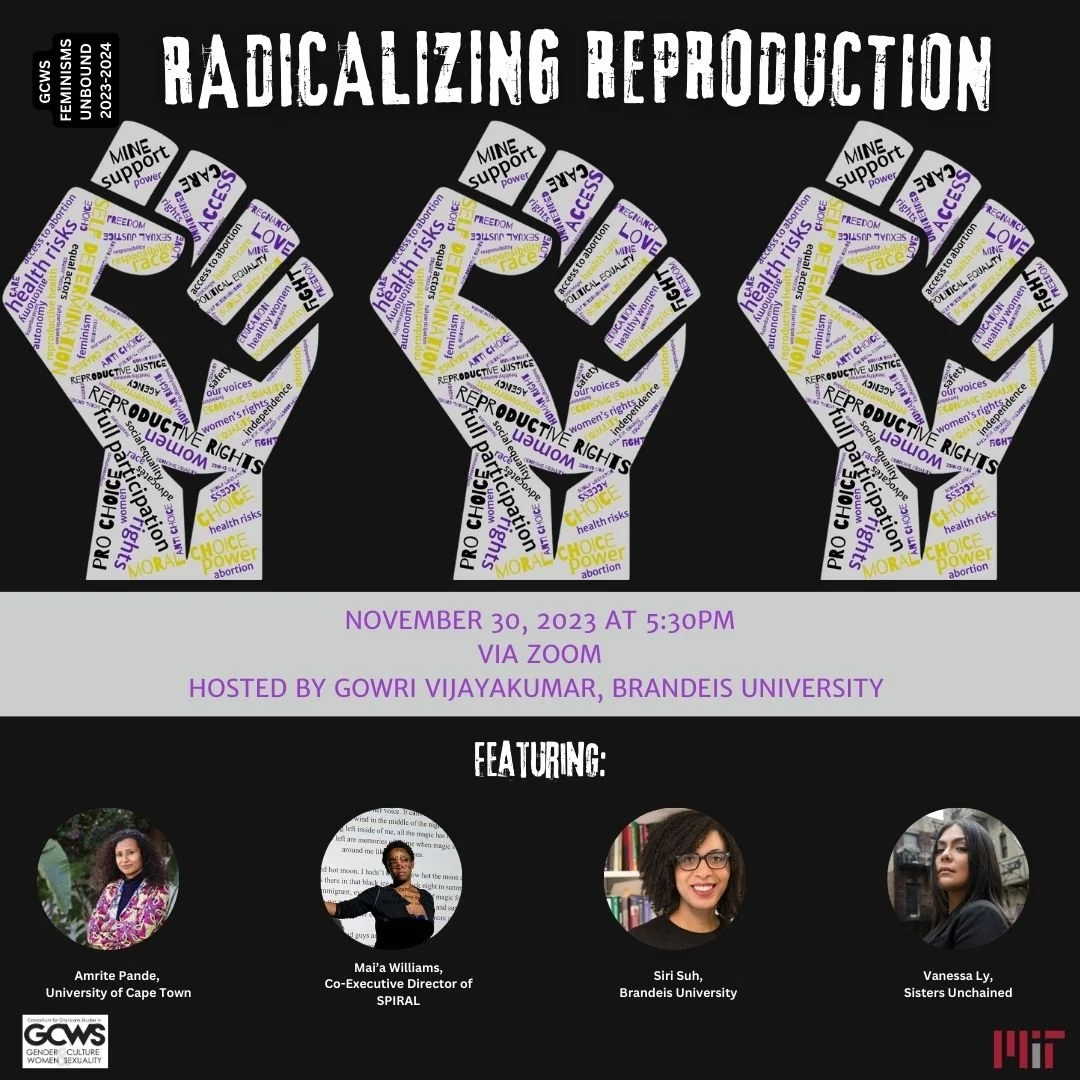
Events
Vibrant events and dynamic conferences
GCWS Events
Upcoming GCWS events:
Each year at the GCWS is packed with events, collaboration opportunities, and conferences. Any upcoming events will be listed below. We typically only host events during the academic year.
Our kickoff panel for the outstanding Feminisms Unbound panel series is on the subject of “Global Antifascist Feminisms”. The panel is designed to share organizing strategies and feminist practices across the globe, that have emerged to resist the resurgence and intensification of global authoritarianism today and to build more democratic and liberatory worlds.
For 15 years, we have championed films that spark conversation. This year is no exception. Join us for a festival featuring works directed entirely by women—narratives that interrogate the intersections of power, identity, and equity. From race and class to sexuality and feminism, these films don't just tell stories; they start movements.
Discover this year’s films!
Campus Feminist Events Google Calendar
Do you want to know what feminist events are happening at our member institutions? Subscribe to our calendar by clicking the +GoogleCalender button below. If you have an event you’d like to add, please send it to gcws@mit.edu.
Past GCWS Events:
Some of our events have been recorded and can be watched on our YouTube channel.
Our inspiration for this roundtable comes at a crucial time in light of the current administration; we want to amplify the importance of Black feminist scholarship and inquiry in this moment by offering multiple perspectives from different disciplines.
This conference invites graduate student scholars, activists, and practitioners to examine what it means and has meant to survive in a world in crisis. What do we mean by crisis? How do historical experiences of crisis inform our understanding of present crises? What is the meaning and purpose of “liberatory practices” in the historical and contemporary world? How do Indigenous, feminist, queer, trans, disability or other lenses offer alternative understandings of crisis? What world is possible after a crisis? By exploring these and more questions, we hope to consider how new methods of study and care practices in our scholarship might allow us to imagine different worlds, develop resilience in a crisis-laden world, become “undisciplined” academically, and/or form more caring and collaborative communities.
Join us at our 14th annual film-festival that features films directed by women and about issues relating to gender, race, sexuality, class and/or feminism. Learn more about each of the individual films here.
Porn is a longstanding site of feminist debate. In contrast to those who see it as a form of violence against women, this panel centers feminist artists and academics who see pornography as a tool for pleasure and politics. Sex educator, artist, and pornographer Annie Sprinkle inspired the Postpornography movement, which is currently thriving among sexual and gender dissidents throughout Latin America and Europe, who make their own porn from a queer or feminist lens. Black Feminist scholars in the United States have re-examined racialized pornography (which was associated with violence and pain), pushing for reading ecstasy, pleasure, and agency into the work of Black women pornographers. Further, scholars and activists have pushed for seeing porn as a form of labor that can be both a site of exploitation and of pleasure. We invite panelists to reflect upon both new pornographies and new ways of interpreting pornography as they intersect with feminist, queer, and anti-racist approaches.
Porn is a longstanding site of feminist debate. In contrast to those who see it as a form of violence against women, this panel centers feminist artists and academics who see pornography as a tool for pleasure and politics. Sex educator, artist, and pornographer Annie Sprinkle inspired the Postpornography movement, which is currently thriving among sexual and gender dissidents throughout Latin America and Europe, who make their own porn from a queer or feminist lens. Black Feminist scholars in the United States have re-examined racialized pornography (which was associated with violence and pain), pushing for reading ecstasy, pleasure, and agency into the work of Black women pornographers. Further, scholars and activists have pushed for seeing porn as a form of labor that can be both a site of exploitation and of pleasure. We invite panelists to reflect upon both new pornographies and new ways of interpreting pornography as they intersect with feminist, queer, and anti-racist approaches.
2024 marks 50 years since the iconic radical Black feminist group, Combahee River Collective, began meeting. As they write in their statement, which is unanimously recognized as an ur-text of radical feminist politics: “We are a collective of Black feminists who have been meeting together since 1974. During that time we have been involved in the process of defining and clarifying our politics, while at the same time doing political work within our own group and in coalition with other progressive organizations and movements.” Taking the work of Combahee as a point of departure, we take the occasion to meditate on “feminist collective/s” as an organizing force, a practice, and concept that is just as urgent in the 21st century as it has been in the history. Whether it reference a group acting together to achieve a goal, a gathering of people to be in community, or the power of collective organizing the idea of the “collective/s” is essential to feminist praxis. Our speakers will ruminate of the collective/s in various forms and from multiple perspectives.
RSVP here
Join the GCWS for the return of the Feminist Intellectuals Reception! Back for a third year, the FIR is a social event that connects feminist-minded faculty members from the GCWS Consortium to promote community, connections, and collaboration!
Join us at our annual film-festival that features films directed by women and about issues relating to gender, race, sexuality, class and/or feminism. Learn more about each of the individual films here.
This panel focuses upon emergent creative sexual pedagogies. Formal sex education often emphasizes risk, reproduction, and a cisheteronormative model of sex, seeking to discipline racially marked and low-income populations and often excluding while also pathologizing queer, trans, or gender nonconforming people. Thinking expansively about sexual pedagogies, this panel incorporates scholars, activists, and artists working in or writing about sexual pedagogy through an intersectional lens in contexts such as educational workshops, performance art, music videos, and postpornography. This panel asks: What is the relationship between sexualities education and social justice?
Reproduction is increasingly the locus of political panic, from attacks on abortion rights to ethical debates about new reproductive technologies. But moral panics about reproduction are nothing new. The reproduction of bodies and labor has been regulated and surveilled in the service of a variety of projects in a variety of historical contexts–tied to nationalism, capitalism, racial domination, class, gender, and sexual regulation. How can feminist scholarship, art, and activism clarify the forms reproductive governance can take, while pushing us to imagine more radical forms of reproductive care?
Wednesday May 10, 2023
6:00-8:00PM
Our annual community meeting is to discuss the future directions of GCWS courses, faculty events, community events, and more. This meeting is open to current, incoming, and former board members, WGS program directors and chairs, WGS faculty, and current and former GCWS teaching teams.
With every feminist critique of contemporary arrangements lies a vision of the world beyond–a feminist imagination. This panel explores artistic, scholarly, and activist practice and the utopian visions that drive and sustain it. What kinds of worlds do feminist, queer, trans, and other visionaries dream of? How do those worlds not only disrupt the existing gendered, sexual, racial, and imperialist capitalist order, but offer the possibility of new forms of collective and creative existence, and new forms of collaboration? What insights do these utopian visions have for feminist technologies, embodiments, labor relations, ecological arrangements, and creative practice? What fractures or failures do our utopian visions reveal? How do they link our feminist histories to our feminist futures? How do they begin to enact those visions in the present?
Time and space, while often seen as linear and confined concepts, can be stretched, altered, and reconfigured. We move through time and space in fits & bursts; some ways of moving and being are deemed normative or “good” and brought to the forefront, while others might be marginalized and cast aside. Here, we instead cast aside normative ideas of time and and space to focus on how liberating the concepts of temporality and spatiality can help us imagine and create new futures, communities, and ways of being. This conference seeks to look at liberatory conceptions of spatiality and temporality, particularly in the contexts of racial justice, abolition, disability rights, queer/trans ecologies, human development, death studies and practices, embodiment, community building, and more.
Join us at our annual film-festival that features films directed by women and about issues relating to gender, race, sexuality, class and/or feminism. Learn more about each of the individual films here.
This panel brings together scholars, activists, and artists whose work attends to pleasure (sexual and otherwise) as a way of creating new worlds in contexts of inequalities and violence. Panelists work in different geographical and cultural contexts who center the powerful pleasures, joys, and world-making of populations at the intersection of sexual/gender dissidence and being marked by their race, class, or caste.
In the past decade we have seen renewed energy infused to the concept of care in feminist theorizing, writing, teaching, and organizing. How might we articulate a feminist ethic of care, and why does it matter? What does care look like in visual culture, writing, organizing, and thinking? If, indeed Black feminist theory in particular is “emphatically preoccupied with care” (as Jennifer Nash states in Black Feminism Re-imagined) how does one develop, display, and espouse an ethic of care in relation to feminist work? Why has care come to characterize so much of our work and what are the stakes of our preoccupation with care? In the context of 21st century assaults on racialized, sexualized, and gendered bodies, what does turning to care clear space for on the page, in the mind, in the community, and in the world? How does an ethic of care issue a challenge to models of consumption, accumulation, or production? What does it mean, look like, or feel like to place care at the center of feminisms?


















